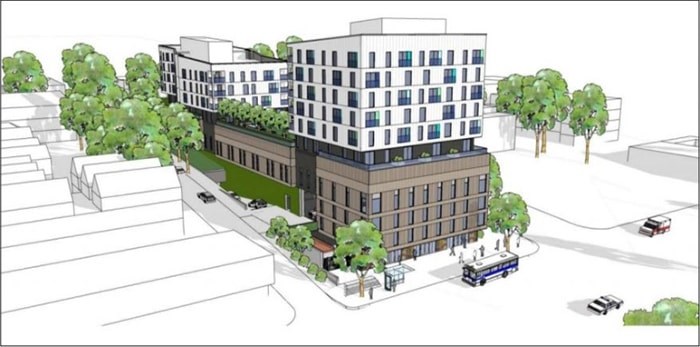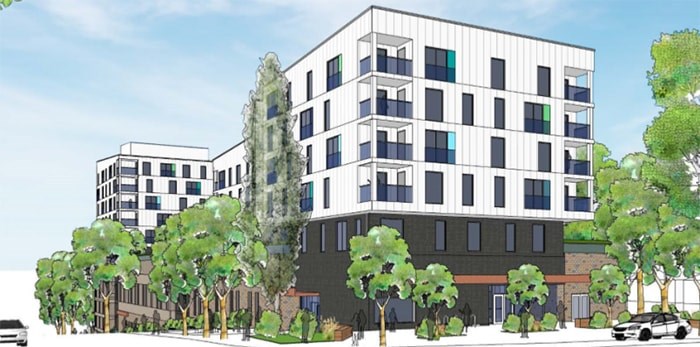Vancouver city council, in a unanimous decision following a two-day public hearing, approved on Feb. 21 a rezoning application that will allow for construction of a detox and social housing complex on a large site at Clark Drive and East First Avenue. The City of Vancouver owns the land and Vancouver Coastal Health and BC Housing are involved in the project, which is designed to address the affordable housing and addiction crises. Bonnie Wilson, director for inner city services for VCH, was in council chambers for the vote. She welcomed the decision. “We’re obviously thrilled that council and this community has been so supportive of this initiative. We’re really excited to become a part of this very vibrant and diverse community,” she told the Courier. The project includes 90 social housing units; social enterprise space for Indigenous healing, wellness and community economic development; a withdrawal centre with 51 in-patient withdrawal management treatment beds, out-patient and home-based withdrawal management services; a sobering centre for people while they withdraw from substances; 20 short-term transitional beds; and an academic teaching, research and learning centre. Wilson said she appreciated concerns some people raised about the project during the public hearing. “I know that it’s hard to sometimes wrap your head around projects like this, but we will work very hard to reassure them, to answer their questions and to give them whatever information they need to help them to feel as comfortable as they can.” Green Party Coun. Adriane Carr noted that the city had received 180 emails in support of the rezoning application and 85 against. During the hearing, 30 speakers voiced support in person, while 14 objected. Supporters praised the proposal for addressing serious issues the city is facing, they insisted it would not only fit in well but be welcomed by most people in the neighbourhood, that it would help reduce the stigma surrounding addiction problems and it would enable people to get help sooner in their addiction battles and save lives. Opponents argued it was too big and that community-scaled facilities throughout the city are preferable. They also questioned why so many services needed to be combined in one building, that the housing units wouldn't be that affordable and that the proponents failed to consult properly. (Read more about what speakers said during the first day of the hearing HERE.) For the housing portion of the building, BC Housing plans to rent about 50 per cent of the units at or below Housing Income Limits (HILs) levels, while the remaining would be rented at CMHC private rental market rates. The organization also hopes to “deepen” the affordability level if possible as the project progresses. At current HILs rates, a household earning $41,500 would pay $930 a month for a studio. A household with an income of $43,500 would pay $1,080 for a one-bedroom, while a household earning $58,000 would pay $1,300. The CMHC private rental market rate for a one-bedroom is $1,730 for the neighbourhood, and $2,500 for a two-bedroom. Carr said while she would also like to see the level of affordability improved, the overall benefits of the project were significant and that many of the concerns people raised had been addressed by the applicant team. “It’s going to be an incredible addition to our community,” she said. Before the vote, Carr tabled an amendment, which was approved, to include a Good Neighbour Agreement in the project. Some councillors, such as OneCity’s Christine Boyle and COPE's Jean Swanson said it would be stigmatizing, but Carr countered that it would build bridges and support within the neighbourhood. Swanson unsuccessfully tried to get other clauses inserted -- one that would require a third of the housing units be rented at welfare shelter rates and another to ensure that all tenants who are demovicted as a result of the project would be able to return to the new building at their current rent or less. City manager Sadhu Johnston said the first clause could threaten the viability of the project, while the second was also problematic as BC Housing is required to do income testing for social housing units. Tenants will, however, have first right of refusal for units if they qualify through income testing. But Swanson succeeded in getting a clause included that will ensure tenants who are demovicted be guaranteed suitable accommodation during displacement at their current rent or less. She said while the project would be better had all her amendments been adopted, she still supported it. NPA Coun. Rebecca Bligh said she hoped the facility would help people get onto the road to recovery faster, while her NPA colleague Colleen Hardwick said although she struggled with the scale of the building, at the end of the day she supported it as a way to address the city’s housing and addiction problems. Rob Fisher, a Grandview-Woodland resident who lives four blocks from the site, wasn’t pleased by the decision. He spoke against it during the public hearing over concerns about its scale. “I understand the purpose, I understand the needs that it's trying to meet, I disagree with the form,” he said. “I’m disappointed. I didn’t hear a lot of acknowledgement of the concerns expressed by neighbours. I heard a lot of acknowledgement of positive sentiment expressed by people that didn’t live in the neighbourhood. I am surprised that the objections of those living in the neighbourhood were acknowledged so little.” Now that the rezoning application is approved, Fisher said opponents have no choice but to accept it. “If people are going to go there for treatment, they’ll be welcomed. They’ll be treated as neighbours. No one wants anyone to come to harm from this. Everyone wants people who need treatment to get it. Everyone wants to welcome the people in social housing as neighbours. We want to be inclusive. Again, the objection was not to the treatment centres, it was not to the social housing. The objection was to the massive size and scale of this [project] and the objection was to the lack of true community engagement." noconnor@vancourier.com
 A public hearing is slated for Feb. 20 on a proposed detox and social housing rental complex at Clark and East First
A public hearing is slated for Feb. 20 on a proposed detox and social housing rental complex at Clark and East First




